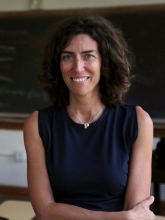CEE Seminar: Connectivity in River Deltas - Observations, Modeling & Implications to Coastal Resilience

Associate Professor
University of Texas, Austin
Department of Civil, Architectural & Environmental Engineering
Abstract: Sea-level rise, subsidence, hypoxia and pollutant intrusion in the groundwater are some of the main factors that put many coastal systems around the world, their populations and ecosystems at great risk. Recent restoration strategies rely on nature-based engineering to allow coastal systems to respond to changes in environmental forcing based on their natural hydrodynamic and morphodynamic functioning. I will cover an overview of current knowledge on delta systems and research challenges and describe a framework based on connectivity to study deltaic systems. This framework, called Delta Connectome, analyzes deltas as networks, which can be composed of physical objects, such as channels and junction/bifurcation nodes, or variables and process couplings. I will quantify different types of connectivity relying on two main study areas and numerical modeling. Most of the field observations have been collected at the Wax Lake Delta (WLD), a naturally prograding delta in coastal Louisiana formed by a river diversion for flood control. Another study area is the Ganges-Brahmaputra-Meghna Delta (GBMD), characterized by a complex surface channel network, significant environmental forcing, and human modifications. Numerical modeling is used for identifying the factors controlling connectivity among surface patterns, the surface and subsurface, and under scenarios of changing forcing.
Bio: Paola Passalacqua is an associate professor of environmental and water resources engineering in the Civil, Architectural and Environmental Engineering Department at the University of Texas at Austin. She graduated summa cum laude from the University of Genoa, Italy, with a bachelor's degree (2002) in environmental engineering and received a master's degree (2005) and a doctorate (2009) in civil engineering from the University of Minnesota. Her research interests include network analysis and dynamics of hydrologic and environmental transport on river networks and deltaic systems, lidar and satellite imagery analysis, multiscale analysis of hydrological processes and quantitative analysis and modeling of landscape forming processes. Passalacqua has been honored with several awards including the National Science Foundation CAREER award (2014), the University of Texas Regents’ Outstanding Teaching Award (2017) and the Association of Environmental Engineering and Science Professors (AEESP) Award for Outstanding Teaching in Environmental Engineering and Science (2016). She currently serves as associate editor for Geophysical Research Letters and Earth Surface Dynamics.
Share
Download
Upcoming Events
-
EECS Seminar: Less Compute, More Intelligence – Efficient and Autonomous Generative AI and Agents
-
MAE 298: Microscopic Robots that Sense, Act and Compute
-
CBE 298 Seminar: Interface Modification for Electrocatalysis
-
CEE Ph.D. Defense Announcement: Machine Learning and Remote Sensing for Environmental Modeling - From Large-Scale Streamflow Forecasting to Malaria Risk Mapping
-
CBE Special Seminar: Operando Electrochemical Methods at Dynamic Energy Materials Interfaces
